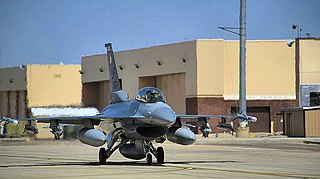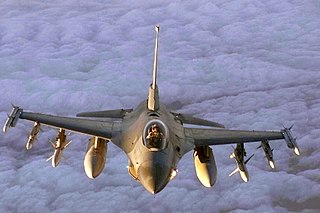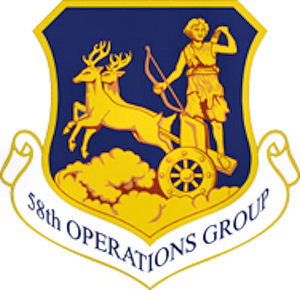
Holloman Air Force Base is a United States Air Force base established in 1942 located six miles (10 km) southwest of the central business district of Alamogordo, and a census-designated place in Otero County, New Mexico, United States. The base was named in honor of Col. George V. Holloman, a pioneer in guided missile research. It is the home of the 49th Wing of the Air Education and Training Command (AETC).

Luke Air Force Base is a United States Air Force base in Maricopa County, Arizona, United States. It is located 7 miles west of the central business district of Glendale, and 15 miles west of Phoenix.

The 64th Aggressor Squadron is a United States Air Force unit. It is assigned to the 57th Adversary Tactics Group at Nellis Air Force Base, Nevada.

The 414th Combat Training Squadron is a United States Air Force unit assigned to the 57th Wing, 57th Operations Group at Nellis Air Force Base, Nevada. The 414th is a non-flying organization charged with hosting Red Flag exercises, Air Combat Command's largest Large Force Exercise (LFE).

The 466th Fighter Squadron is the 419th Fighter Wing's operational flying squadron. It is located at Hill Air Force Base, Utah.

The 8th Fighter Squadron is an active United States Air Force squadron, assigned to the 54th Fighter Group Air Education and Training Command, stationed at Holloman Air Force Base, New Mexico. It currently operates the General Dynamics F-16 Fighting Falcon aircraft, conducting initial training, transition and instructor upgrades training. The squadron have a proud lineage of aircraft and assignments. The origin of the 8th Fighter Squadron can be traced back to 1940, and since then, the squadron has served in several war and peace time assignments across the globe.

The 61st Fighter Squadron is an active United States Air Force unit, assigned to the 56th Operations Group, at Luke Air Force Base, Arizona. It operates the F-35 Lightning II aircraft, conducting Pilot training.

The 63d Fighter Squadron is an active United States Air Force unit, assigned to the 56th Operations Group, at Luke Air Force Base, Arizona. It operates the F-35A aircraft, and conducts advanced fighter training since its reactivation in 2016. When this Squadron was reactivated in 1975, their mission was to train pilots and weapons systems officers for the McDonnell F-4E Phantom II, and they switched to the F-4D in 1978.

The 69th Fighter Squadron is a United States Air Force Reserve fighter squadron. It is assigned to the 944th Operations Group, stationed at Luke Air Force Base, Arizona.

The 301st Fighter Squadron is a United States Air Force Reserve squadron, assigned to the 325th Operations Group, stationed at Tyndall Air Force Base, Florida. It is an associate unit of the active duty 325th Fighter Wing.

The 309th Fighter Squadron is part of the 56th Operations Group at Luke Air Force Base, Arizona. It operates the F-16 Fighting Falcon aircraft conducting advanced fighter training.

The 310th Fighter Squadron is part of the 56th Operations Group at Luke Air Force Base, Arizona. It operates the Lockheed Martin F-35A Lightning II, conducting advanced fighter training.

The 311th Fighter Squadron (Sidewinders) is part of the 54th Fighter Group at Holloman Air Force Base, New Mexico which is a geographically separated unit under the 56th Fighter Wing at Luke Air Force Base, Arizona. It operates the General Dynamics F-16 Fighting Falcon aircraft conducting advanced fighter training. The squadron previously operated the Fighting Falcon conducting advanced fighter training at Luke and was inactivated due to budget constraints after the end of the Cold War. It was recently reactivated at Holloman and the aircraft were received from the 309th Fighter Squadron.

The 425th Fighter Squadron is part of the 56th Operations Group at Luke Air Force Base, Arizona. It operates the General Dynamics F-16 Fighting Falcon aircraft conducting advanced fighter training for Republic of Singapore Air Force F-16 pilots.

The 54th Fighter Group is an active unit of the United States Air Force stationed at Holloman Air Force Base, New Mexico and assigned to the 49th Wing of Air Education and Training Command. The group was reactivated in March 2014.

The 388th Operations Group is the flying component of the 388th Fighter Wing, assigned to the Air Combat Command Twelfth Air Force. The group is stationed at Hill Air Force Base, Utah.

The 58th Operations Group is the operational flying component of the United States Air Force 58th Special Operations Wing. It is stationed at Kirtland Air Force Base, New Mexico.

The 29th Attack Squadron is a remotely piloted vehicle training unit of the United States Air Force. Assigned to the 49th Operations Group, 49th Wing at Holloman Air Force Base, New Mexico. Flying the General Atomics MQ-9 Reaper. It was activated on 23 October 2009.

The 72nd Fighter Squadron is an inactive United States Air Force unit. Its last assignment was with the 56th Operations Group, based at MacDill Air Force Base, Florida. It was inactivated on 19 June 1992.

The 312th Fighter Squadron is an active United States Air Force unit, stationed at Luke Air Force Base, Arizona. Its last previous assignment was with the 58th Tactical Training Wing at Luke, where it was inactivated on 18 January 1991. Upon inactivation, the squadron's personnel, equipment and aircraft were transferred to the 311th Fighter Squadron.





















